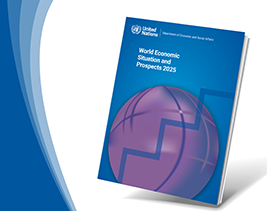Things You Need To Know
6 things you should know about the global economy in 2025

“Let’s make 2025 the year we put the world on track for a prosperous and sustainable future,” urged UN Secretary-General António Guterres, as UN DESA released its global economic outlook last month in the World Economic Situation and Prospects 2025. Here are 6 things you should know about the global economy:
1. Global economic growth remains below the pre-pandemic average.
The report projects global economic growth to remain at 2.8 per cent in 2025, below the pre-pandemic average of 3.2 per cent. While easing inflation and monetary easing offer some respite, challenges such as trade tensions, geopolitical conflicts, and elevated debt burdens threaten the outlook.
2. Regional growth prospects vary widely.
East and South Asia will remain global growth drivers in 2025, with projected expansions of 4.7 per cent and 5.7 per cent respectively. Africa’s growth is forecast to improve slightly to 3.7 per cent but is restrained by high debt costs and climate-related challenges.
3. The outlook is precarious for many countries.
Many vulnerable economies are seeing downward revisions to their growth outlook, which remains well below pre-pandemic trends. This weak performance is compounding risks to achieving the Sustainable Development Goals, with progress in reducing poverty continuing to be slow and uneven.
4. Falling inflation creates room for monetary easing, though challenges persist.
Global inflation is projected to decline further, from 4 per cent in 2024 to 3.4 per cent in 2025, offering relief to households and businesses. However, many developing countries continue to grapple with elevated inflation, particularly in food prices.
5. Governments are adopting gradual fiscal consolidation to improve debt sustainability and rebuild fiscal space.
Fiscal pressures are particularly severe in Africa, where rising debt-servicing burdens are increasingly diverting resources away from essential public services and investment. On a GDP-weighted basis, African governments allocated 27 per cent of revenues to interest payments in 2024, up from 19 per cent in 2019 and 7 per cent in 2007.
6. Critical minerals play a vital role in advancing the energy transition and supporting sustainable development.
Resource-rich developing countries can benefit from rising global demand for critical minerals to create jobs and boost sustainable development. “Critical minerals have immense potential to accelerate sustainable development, but only if managed responsibly,” according to Li Junhua, UN Under-Secretary-General for Economic and Social Affairs.
Learn more in the World Economic Situation and Prospects 2025 here.
 Welcome to the United Nations
Welcome to the United Nations